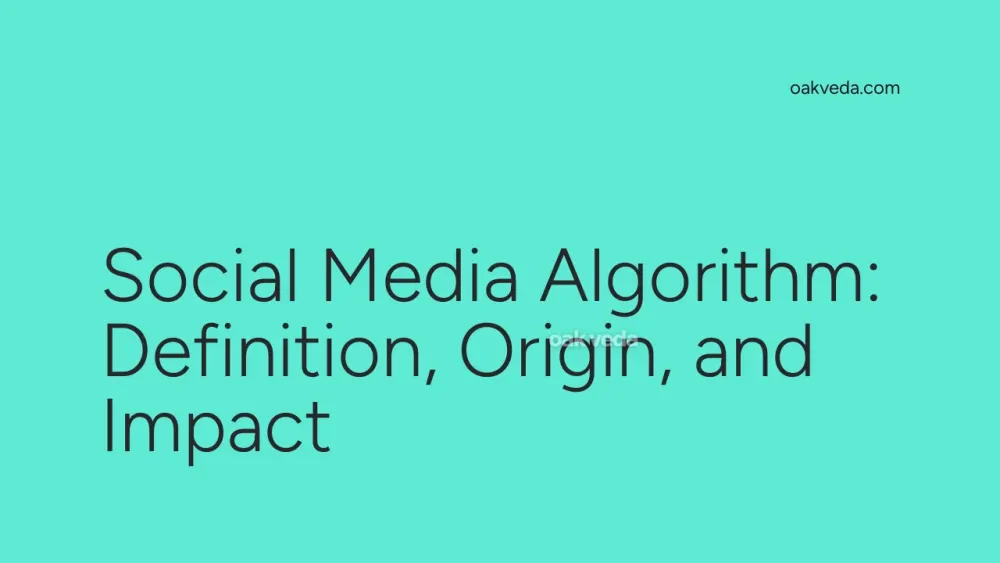
What is a Social Media Algorithm?
A social media algorithm is a complex set of rules and calculations used by digital platforms to determine what content to display to users and in what order. These sophisticated systems are designed to enhance user experience by presenting the most relevant and engaging content based on various factors.
Origin and Development of Social Media Algorithms
The concept of algorithms in social media emerged with the growth of digital platforms in the early 2000s. As user-generated content exploded, platforms needed a way to organize and prioritize information. Facebook's News Feed, introduced in 2006, was one of the first major implementations of a social media algorithm, revolutionizing how users interacted with content on the platform.
How Social Media Algorithms Work
Social media algorithms operate on a combination of factors, including:
- Relevance: How closely the content matches the user's interests
- Recency: When the content was posted
- Engagement: The number of likes, comments, and shares a post receives
- User Behavior: Past interactions and preferences of the user
- Relationships: The closeness of the user to the content creator
These algorithms use machine learning techniques to analyze vast amounts of data, continuously adapting to user behavior and platform goals.
Types of Social Media Algorithms
While each platform's algorithm is unique, they generally fall into three categories:
- Chronological: Displays content in order of posting time
- Engagement-based: Prioritizes content with high user interaction
- Personalized: Tailors content based on individual user preferences and behavior
Most modern platforms use a hybrid approach, combining elements from all three types to create a more nuanced user experience.
Popular Examples of Social Media Algorithms
-
Facebook's EdgeRank: This algorithm considers affinity, weight, and time decay to determine content visibility.
-
Instagram's Explore Page: Uses machine learning to recommend content based on user interactions and preferences.
-
Twitter's "For You" Feed: Combines chronological and algorithmic approaches to present a mix of recent and relevant tweets.
-
TikTok's "For You" Page: Highly personalized algorithm that quickly adapts to user preferences, contributing to the app's addictive nature.
Impact of Algorithms on Social Media Culture
Social media algorithms have profoundly shaped online culture and user behavior:
- Content Creation: Creators adapt their content to algorithm preferences, leading to trends and viral challenges.
- Echo Chambers: Algorithms can reinforce existing beliefs by showing users content that aligns with their views.
- Attention Economy: The fight for visibility has intensified, with content designed to maximize engagement.
- User Experience: Personalized feeds have made social media more engaging but potentially less diverse.
Controversies Surrounding Social Media Algorithms
Several debates have emerged around the use of algorithms:
- Privacy Concerns: The extensive data collection required for personalization raises privacy issues.
- Misinformation Spread: Algorithms can inadvertently amplify false or misleading content.
- Mental Health Impact: The addictive nature of algorithm-driven feeds may contribute to social media addiction and anxiety.
- Transparency Issues: The "black box" nature of algorithms makes it difficult for users to understand why they see certain content.
How Brands and Influencers Use Social Media Algorithms
Understanding and leveraging algorithms is crucial for digital marketing success:
- Content Optimization: Brands create content that aligns with algorithm preferences for maximum visibility.
- Engagement Strategies: Influencers encourage likes, comments, and shares to boost their content's reach.
- Timing: Posts are scheduled when target audiences are most active to increase initial engagement.
- Cross-Platform Promotion: Content is shared across multiple platforms to maximize exposure and trigger algorithm boosts.
Future Trends in Social Media Algorithms
As technology evolves, we can expect several developments:
- Increased Personalization: AI advancements will lead to even more tailored user experiences.
- Ethical AI: Platforms may implement more transparent and fair algorithmic practices.
- Content Diversity: Algorithms may be adjusted to expose users to a wider range of perspectives.
- Real-Time Adaptation: Algorithms will become more responsive to current events and user moods.
- Integration of AR/VR: As these technologies grow, algorithms will adapt to incorporate new forms of content and interaction.
FAQs about Social Media Algorithms
-
Can I opt out of algorithmic content sorting? Some platforms offer limited options to view content chronologically, but most rely heavily on algorithms for content distribution.
-
Do algorithms favor paid content? While organic reach is possible, many platforms do give preference to paid content in their algorithms.
-
How often do social media algorithms change? Platforms frequently update their algorithms, sometimes making major changes several times a year.
-
Can I "beat" the algorithm? While you can't outsmart the algorithm, understanding its preferences can help you create more effective content.
-
Are social media algorithms biased? Algorithms can reflect and amplify existing biases in data and society, a concern that platforms are increasingly addressing.
In conclusion, social media algorithms play a pivotal role in shaping our online experiences. As these systems continue to evolve, understanding their function and impact will be crucial for users, creators, and marketers alike. By staying informed about algorithmic trends and best practices, individuals and brands can navigate the ever-changing landscape of social media more effectively.
You may be interested in:
- OOMF: Definition, Origin, and Impact on Social Media
- Cringe: Definition, Origin, and Impact on Social Media
- Focus Groups: Definition, Origin, and Impact on Social Media
- Campsite.bio: Definition, Origin, and Impact on Social Media
- Thought Leader: Definition, Origin, and Impact on Social Media
- Social Media Etiquette: Definition, Origin, and Impact

